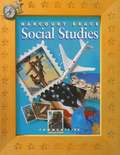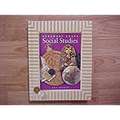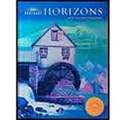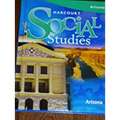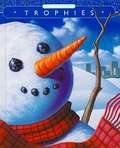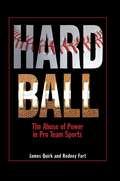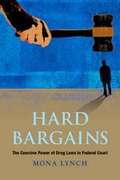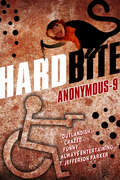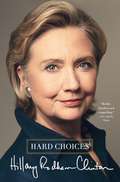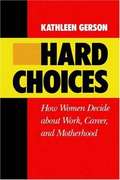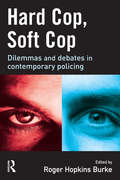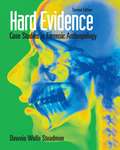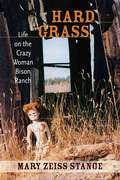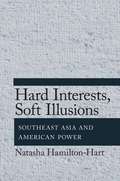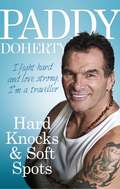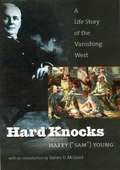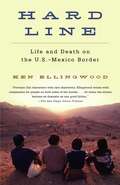- Table View
- List View
Harcourt Brace Ancient Civilizations
by Richard G. Boehm Priscilla H. Porter Claudia Hoone Thomas M. Mcgowan Mabel C. McKinney-Browning Ofelia B. MiramontesHarcourt Brace Social Studies: Communities
by Richard G. Boehm Priscilla H. Porter Claudia Hoone Thomas M. Mcgowan Mabel C. McKinney-Browning Ofelia B. MiramontesThis book contains all you need to learn and know about communities.
Harcourt Brace Social Studies: The World
by Richard G. Boehm Priscilla H. Porter Claudia Hoone Thomas M. Mcgowan Mabel C. McKinney-Browning Ofelia B. MiramontesThink about the many groups of whi8ch you are a part. Your family, your class, and your community are different kinds of groups, and you are a member of each one. You are also a member or citizen of your town or city, your state, and your country. Citizens work to improve the many groups to which they belong and to make their world a better place.
Harcourt Horizons: About My Community
by Michael J. Berson Bruce E. Larson Tyrone Howard Sherry FieldA social studies text book that has questions and a short activity at the end of each unit.
Harcourt Horizons: Beginnings
by Harcourt School PublishersThis book helps students see how the past and the present are linked so they can understand how the events of today are linked to the future.
Harcourt Horizons: States and Regions
by Michael J. BersonHarcourt Horizons: States and Regions will help you understand why people are proud to be citizens of the United States. You will learn about the four regions of the United States--the Northeast, South, Middle West, and West. You will also learn about the country's land, water, and climate. In addition, you will find out about the many different people of this country.
Harcourt Horizons: United States History, Canada, Mexico and Central America
by Michael J. BersonIn Harcourt Horizons United States one will be studying the United States, past and present events and the places where those events occurred.
Harcourt Horizons: World Regions
by HarcourtThis book is learning about the world. Despite differences in appearance, language, or ways of life, the people of the world share basic needs for food, clothing, and shelter. As you read this book, you will find out about people in other countries. You will learn about their history and how they live today. You will also learn how they and you are alike and different. Knowing about people around the world will help you better understand world events of the past, present, and future.
Harcourt Social Studies (Ohio)
by Michael J. Berson Tyrone C. Howard Cinthia SalinasNIMAC-sourced textbook
Harcourt Social Studies Arizona: Student Edition Grade 4 Arizona 2007
by Michael J. Berson Tyrone C. Howard Cinthia Salinas<P>Have you ever wondered how Arizona came to be and how its past continues to affect you today? This year, you will find out.<P> You will study the geography of Arizona. <P>Geography is the study of the Earth's surface and the ways people use it.<P> You will also learn about history, economics, government, and culture. You will learn how areas change over time.
Harcourt Social Studies: Civil War to Present (Arkansas Edition)
by Michael J. Berson Tyrone C. Howard Cinthia SalinasUS history textbook for Arkansas students.
Harcourt Trophies: Here and There
by HarcourtAdventures in books can take you to some amazing places. The adventures in this book take you to the world of butterflies, on a chase for a runaway dog, and to meet children just like you who love to play and work together.
Hard Art, DC 1979
by Lucian PerkinsCapital Gift 2013, DCist"Photos capturing the raw magnetism of performers like Charlie Danbury of Trenchmouth and H.R. of Bad Brains signal the power of the music. Perkins is also fascinated with the audience at these events, showcasing dingy stairwells and sweat-glazed faces. In telling shots, performers and audience blur into a frenzied mass. Musician MacKaye, of the Untouchables, gives a firsthand account of being a 14-year-old at these shows, crossing dangerous parts of D.C. in order to stand with strangers in derelict buildings and hear live music. Musician Rollins's brief essay on one of the bands, the Teen Idles, speaks to the intensity and commitment of those involved."--Publishers Weekly"What do punk rock, a Washington Post reporter and books have in common?...For the most part, nothing--except for books by Washington Post reporters about punk rock."--Huffington Post"Many punk fans will purchase Hard Art for the novelty of seeing H.R. as he was before Bad Brains moved to New York and became legends, or Ian MacKaye as he was before he shaved his head, and formed Dischord Records, Minor Threat, and Fugazi. The book deserves a wider readership than that. Perkins's skill as a portraitist is such that you can see the energy and potential in these young men's faces even without the context of their future roles as icons. Equally worthwhile are the portraits of those who did not become icons, but participated in the shows."--Philadelphia Review of Books"A great document for the DC scene."--TRUST FanzineIn 1979, a soon-to-erupt punk scene took hold in Washington, DC, with bands like the Bad Brains, Trenchmouth, Teen Idles, the Untouchables, and the Slickee Boys, among others, at the forefront. Lucian Perkins, later a Pulitzer Prize-winning photojournalist for the Washington Post, was then an intern who photographed several pivotal shows over a short period of time. His now iconic photos of these shows are complemented by punk rock musician Alec MacKaye's narrative that runs throughout the book and an essay by Henry Rollins.Hard Art, DC 1979 is both a book and a traveling exhibition of photographs by Lucian Perkins. The exhibition is curated and edited by photographer and photo editor Lely Constantinople and Jayme McLellan, director of Civilian Art Projects, Washington, DC, with photographs being shown as a group for the first time.In 1995, Lely Constantinople was hired by Perkins to manage his extensive photographic collection spanning a twenty-five year career with the Post. While looking through negatives in his basement, she found the punk images and recognized MacKaye, her then boyfriend (now husband). She asked to make contact sheets to show him, thinking he might recognize himself and others, and was surprised by how excited MacKaye was to see the images. "Those pictures were the holy grail! Not that many people brought cameras to shows then so I always wondered who he was and what happened to the pictures he took. He was at some of the best shows."MacKaye's text offers an intimate exploration of the moment from two perspectives: that of a fourteen-year-old experiencing music on his own terms for the first time, and a look again at a movement that fueled an underground generation musically and philosophically. His examination is not a nostalgic review of glory days gone, as much as a present conversation about the continuation of a way of thinking that still endures. Hard Art, DC 1979 is an intimate snapshot of "the time before the time" that punk rock found firm footing in the US. These images capture the cathartic, infectious energy present in any group of people who seek to change their communities through music and art.
Hard Ball: The Abuse of Power in Pro Team Sports
by James Quirk Rodney D. FortWhat can possibly account for the strange state of affairs in professional sports today? There are billionaire owners and millionaire players, but both groups are constantly squabbling over money. Many pro teams appear to be virtual "cash machines," generating astronomical annual revenues, but their owners seem willing to uproot them and move to any city willing to promise increased profits. At the same time, mayors continue to cook up "sweetheart deals" that lavish benefits on wealthy teams while imposing crushing financial hardships on cities that are already strapped with debt. To fans today, professional sports teams often look more like professional extortionists.In Hard Ball, James Quirk and Rodney Fort take on a daunting challenge: explaining exactly how things have gotten to this point and proposing a way out. Both authors are professional economists who specialize in the economics of sports. Their previous book, Pay Dirt: The Business of Professional Team Sports, is widely acknowledged as the Bible of sports economics. Here, however, they are writing for sports fans who are trying to make sense out of the perplexing world of pro team sports. It is not money, in itself, that is the cause of today's problems, they assert. In fact, the real problem stems from one simple fact: pro sports are monopolies that are fully sanctioned by the U.S. government. Eliminate the monopolies, say Quirk and Fort, and all problems can be solved. If the monopolies are allowed to persist, so will today's woes.The authors discuss all four major pro team sports: baseball, football, basketball, and hockey. Hard Ball is filled with anecdotes, case studies, and factual information that are brought together here for the first time. Quirk and Fort devote chapters to the main protagonists in the pro sports saga--media, unions, players, owners, politicians, and leagues--before they offer their own prescription for correcting the ills that afflict sports today. The result is an engaging and persuasive book that is sure to be widely read, cited, and debated. It is essential reading for every fan.
Hard Bargains: The Coercive Power of Drug Laws in Federal Court
by Mona LynchThe convergence of tough-on-crime politics, stiffer sentencing laws, and jurisdictional expansion in the 1970s and 1980s increased the powers of federal prosecutors in unprecedented ways. In Hard Bargains, social psychologist Mona Lynch investigates the increased power of these prosecutors in our age of mass incarceration. Lynch documents how prosecutors use punitive federal drug laws to coerce guilty pleas and obtain long prison sentences for defendants—particularly those who are African American— and exposes deep injustices in the federal courts. As a result of the War on Drugs, the number of drug cases prosecuted each year in federal courts has increased fivefold since 1980. Lynch goes behind the scenes in three federal court districts and finds that federal prosecutors have considerable discretion in adjudicating these cases. Federal drug laws are wielded differently in each district, but with such force to overwhelm defendants’ ability to assert their rights. For drug defendants with prior convictions, the stakes are even higher since prosecutors can file charges that incur lengthy prison sentences—including life in prison without parole. Through extensive field research, Lynch finds that prosecutors frequently use the threat of extremely severe sentences to compel defendants to plead guilty rather than go to trial and risk much harsher punishment. Lynch also shows that the highly discretionary ways in which federal prosecutors work with law enforcement have led to significant racial disparities in federal courts. For instance, most federal charges for crack cocaine offenses are brought against African Americans even though whites are more likely to use crack. In addition, Latinos are increasingly entering the federal system as a result of aggressive immigration crackdowns that also target illicit drugs. Hard Bargains provides an incisive and revealing look at how legal reforms over the last five decades have shifted excessive authority to federal prosecutors, resulting in the erosion of defendants’ rights and extreme sentences for those convicted. Lynch proposes a broad overhaul of the federal criminal justice system to restore the balance of power and retreat from the punitive indulgences of the War on Drugs.
Hard Bite
by Anonymous-9Hard Bite is outlandish in every way -- a crazed noir excursion into an unprecedented heart of darkness. From the opening line on, it challenges and confronts, attacks and confounds. Violent and sometimes funny, always entertaining.
Hard Choices: A Memoir
by Hillary Rodham ClintonHillary Rodham Clinton’s inside account of the crises, choices, and challenges she faced during her four years as America’s 67th Secretary of State, and how those experiences drive her view of the future.“All of us face hard choices in our lives,” Hillary Rodham Clinton writes at the start of this personal chronicle of years at the center of world events. “Life is about making such choices. Our choices and how we handle them shape the people we become.”In the aftermath of her 2008 presidential run, she expected to return to representing New York in the United States Senate. To her surprise, her former rival for the Democratic Party nomination, newly elected President Barack Obama, asked her to serve in his administration as Secretary of State. This memoir is the story of the four extraordinary and historic years that followed, and the hard choices that she and her colleagues confronted.Secretary Clinton and President Obama had to decide how to repair fractured alliances, wind down two wars, and address a global financial crisis. They faced a rising competitor in China, growing threats from Iran and North Korea, and revolutions across the Middle East. Along the way, they grappled with some of the toughest dilemmas of US foreign policy, especially the decision to send Americans into harm’s way, from Afghanistan to Libya to the hunt for Osama bin Laden.By the end of her tenure, Secretary Clinton had visited 112 countries, traveled nearly one million miles, and gained a truly global perspective on many of the major trends reshaping the landscape of the twenty-first century, from economic inequality to climate change to revolutions in energy, communications, and health. Drawing on conversations with numerous leaders and experts, Secretary Clinton offers her views on what it will take for the United States to compete and thrive in an interdependent world. She makes a passionate case for human rights and the full participation in society of women, youth, and LGBT people. An astute eyewitness to decades of social change, she distinguishes the trendlines from the headlines and describes the progress occurring throughout the world, day after day.Secretary Clinton’s descriptions of diplomatic conversations at the highest levels offer readers a master class in international relations, as does her analysis of how we can best use “smart power” to deliver security and prosperity in a rapidly changing world—one in which America remains the indispensable nation.
Hard Choices: How Women Decide about Work, Career, and Motherhood
by Kathleen GersonHow do women choose between work and family commitments? And what are the causes, limits, and consequences of the "subtle revolution" in women's choices over the 1960s and 1970s? To answer these questions, Kathleen Gerson analyzes the experiences of a carefully selected group of middle-class and working-class women who were young adults in the 1970s. Their informative life histories reveal the emerging social forces in American society that have led today's women to face several difficult choices.
Hard Cop, Soft Cop
by Roger Hopkins BurkeThis is a book about policing styles in the broadest sense, looking at zero tolerance policing at one extreme and 'softer' approaches to policing at the other. It is particularly concerned to explore the dilemmas and moral ambiguities inherent in the tensions between different policing approaches. Rather than seeking to juxtapose 'hard' and 'soft' policing styles the guiding thread of the book is the notion that policing is both pervasive and insidious. Different policing styles, whether conducted by the public police service, private security or social work agencies, are all part of a multi-agency corporate crime control industry which provides the essential context for an understanding of these different approaches.
Hard Evidence: Case Studies in Forensic Anthropology
by Dawnie Wolfe SteadmanAn essential supplement to a forensic anthropology text, this reader provides case studies that demonstrate innovative approaches and practical experiences in the field. The book provides both introductory and advanced students with a strong sense of the?cases?that forensic anthropologists become involved, along with?their professional and ethical responsibilities, the scientific rigor required, and the multidisciplinary nature of the science. For courses in Forensic Anthropology and Forensic Science.
Hard Grass: Life on the Crazy Woman Bison Ranch
by Mary Zeiss StangeMary Zeiss Stange's story of running a bison ranch with her husband in southeastern Montana--on the outskirts of nowhere and far-from-here--is a narrative of survival in a landscape and a society at once harsh and alluring. In this series of essays she illustrates the realities of ranch life at a time when the New West of subdivision, ranchettes, telecommuting, and tourism collides with the True West of too much, too little, too hard, and too harsh. This society is molded by the climate, and both run to extremes, simultaneously unforgiving, often brutal, yet capable of unalloyed charm and breathtaking beauty.Her stories explore the myths and realities of ranch life in modern America--the brandings, rodeos, and demolition derbies that are major events, and the social, environmental, and political factors at work in shaping the land and the people.Less memoir than deep history of people and place, these vivid, naturalistic tales examine the complex relationships that comprise life in the rural West today.
Hard Interests, Soft Illusions: Southeast Asia and American Power
by Natasha Hamilton-HartIn Hard Interests, Soft Illusions, Natasha Hamilton-Hart explores the belief held by foreign policy elites in much of Southeast Asia-Indonesia, Malaysia, the Philippines, Thailand, Singapore, and Vietnam-that the United States is a relatively benign power. She argues that this belief is an important factor underpinning U.S. preeminence in the region, because beliefs inform specific foreign policy decisions and form the basis for broad orientations of alignment, opposition, or nonalignment. Such foundational beliefs, however, do not simply reflect objective facts and reasoning processes. Hamilton-Hart argues that they are driven by both interests-in this case the political and economic interests of ruling groups in Southeast Asia-and illusions.Hamilton-Hart shows how the information landscape and standards of professional expertise within the foreign policy communities of Southeast Asia shape beliefs about the United States. These opinions frequently rest on deeply biased understandings of national history that dominate perceptions of the past and underlie strategic assessments of the present and future. Members of the foreign policy community rarely engage in probabilistic reasoning or effortful knowledge-testing strategies. This does not mean, she emphasizes, that the beliefs are insincere or merely instrumental rationalizations. Rather, cognitive and affective biases in the ways humans access and use information mean that interests influence beliefs; how they do so depends on available information, the social organization and practices of a professional sphere, and prevailing standards for generating knowledge.
Hard Knocks & Soft Spots
by Paddy Doherty'I fight hard and love strong. I'm a traveller.'Paddy Doherty loves his life as an Irish traveller, but as a child he felt like an outsider. He was different to his siblings. On the rare occasions he went to school, he was bullied for being a gypsy boy. And beyond the gates of the camp he found nothing but hostility. Slowly, Paddy's hurt turned into anger and by the age of 11 he had started out on an illustrious career in bare-knuckle fighting. This earned him a position as one of the most well-respected (and feared) men in the travelling community. Yet while he won countless contests in the ring, the real battles he faced were very much outside.In this deeply honest autobiography, he tells of how he has loved and lost five children; plummeted to seven stone while battling depression, drink and drugs. He describes how it feels to be shot point-blank in the head and the lengths he'll go to to protect his people, as well as life since My Big Fat Gypsy Wedding and Big Brother.Told with all the warmth and humour he is famed for, Paddy's rich and colourful story is one that will stay with you for a long time to come.
Hard Knocks: A Life Story of the Vanishing West
by Harry YoungLong out of print, Young's story of his adventures in the early West is available again with a new introduction by Calamity Jane biographer James D. McLaird. Read Young's eyewitness accounts of Calamity Jane on the Jenney Expedition and the shooting of Wild Bill Hickok.
Hard Line: Life and Death on the U.S.-Mexico Border
by Ken EllingwoodThe Southwestern border is one of the most fascinating places in America, a region of rugged beauty and small communities that coexist across the international line. In the past decade, the area has also become deadly as illegal immigration has shifted into some of the harshest territory on the continent, reshaping life on both sides of the border. InHard Line,Ken Ellingwood, a correspondent for theLos Angeles Times, captures the heart of this complex and fascinating land, through the dramatic stories of undocumented immigrants and the border agents who track them through the desert, Native Americans divided between two countries, human rights workers aiding the migrantsand ranchers taking the law into their own hands. This is a vivid portrait of a place and its people, and a moving story of the West that has major implications for the nation as a whole.

